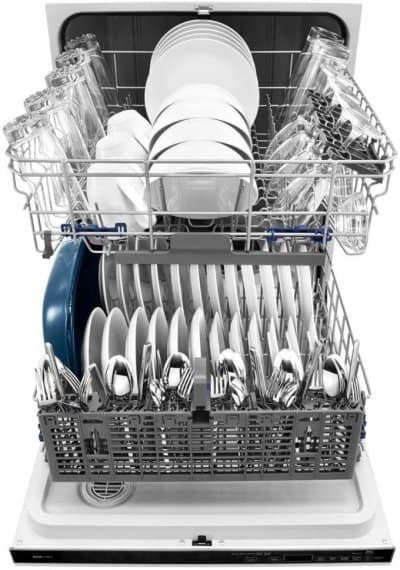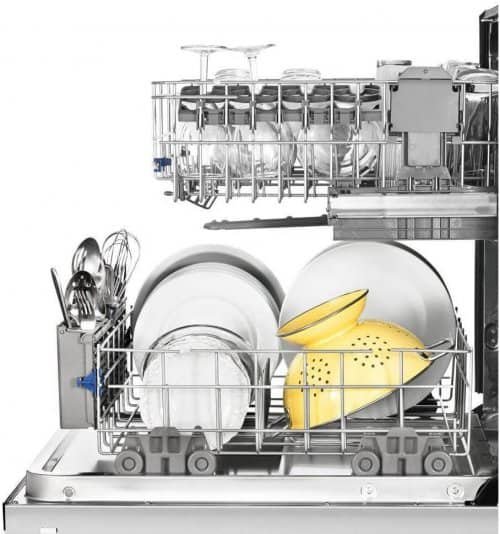When it comes to kitchen appliances, dishwashers are a convenient and time-saving addition to any household. They efficiently clean and sanitize our dishes, leaving us with more time to focus on other tasks. However, there is a common concern among many culinary enthusiasts: do dishwashers dull knives? In this article, we will explore this topic and provide you with insights on how to maintain the sharpness of your knives while still enjoying the convenience of a dishwasher.
Table of Contents
How Dishwashers Work?
Before delving into the impact dishwashers have on knife blades, it’s important to understand how these appliances function. Dishwashers use a combination of hot water, detergents, and mechanical action to clean and sanitize dishes. While this process is effective for most items, it can potentially affect the sharpness of knives.
The Effect of Dishwasher on Knife Blades
One of the main factors contributing to knife dulling in dishwashers is the combination of high water temperatures and chemical detergents. The heat can soften the blade, making it more susceptible to bending or losing its sharp edge. Additionally, the harsh detergents used in dishwashers can erode the protective layers on the knife, further reducing its cutting performance.
Continuous exposure to water and moisture can also impact the sharpness of knife blades. Dishwashers typically involve multiple cycles, including rinsing, washing, and drying. This prolonged exposure to moisture can cause the blade to corrode or develop rust, which ultimately dulls the cutting edge.
Types of Knives and Their Susceptibility to Dulling
The susceptibility of knives to dulling in dishwashers depends on various factors, such as the hardness and composition of the blade. Knives with harder blades, such as those made of high-carbon stainless steel or ceramic, tend to be more resistant to dulling. On the other hand, knives with softer blades, such as those made of carbon steel, may be more prone to dulling in the dishwasher.
Different knife materials also exhibit varying levels of resilience. For instance, stainless steel knives are generally more resistant to corrosion, while carbon steel knives require extra care to prevent rust. Understanding the characteristics of your knives can help you make informed decisions regarding dishwasher use.
Proper Knife Care and Maintenance
To maintain the longevity and sharpness of your knives, it is recommended to handwash them whenever possible. Handwashing allows for better control over the cleaning process, ensuring that the knife is not exposed to excessive heat or harsh detergents. Gently wash the knife with mild dish soap and warm water, and immediately after washing the knife with mild dish soap and warm water, make sure to dry it thoroughly to prevent moisture from lingering on the blade. Using a soft cloth or towel, carefully wipe the knife dry, paying extra attention to the cutting edge.
In addition to handwashing, using knife guards or blade covers during storage can help protect the sharpness of your knives. These guards provide a barrier between the blades, preventing them from rubbing against each other or other utensils, which can cause dulling or damage.
Best Practices for Dishwasher Use
If you prefer to use the dishwasher for convenience, there are some best practices you can follow to minimize the impact on your knife blades. Firstly, always ensure that you prepare the knives for the dishwasher correctly. This includes removing any food particles or debris from the blades and handles.
When loading knives into the dishwasher, it’s essential to place them securely in the utensil holder or rack. Avoid overcrowding, as this can lead to the blades knocking against each other, resulting in potential damage or dulling. If your dishwasher has a separate compartment for knives, utilize it to provide extra protection.

Alternatives to Dishwashers for Knife Cleaning
For those who prefer to avoid dishwashers altogether when it comes to knife cleaning, there are alternative methods to consider. Handwashing remains the most recommended approach for preserving knife sharpness. By handwashing, you have complete control over the cleaning process, ensuring that the knives are treated gently and not exposed to harmful conditions.
In addition to handwashing, you can explore other cleaning methods such as using knife-specific cleaning solutions or soaking the knives in a gentle detergent solution before rinsing and drying them thoroughly. These methods allow you to maintain the sharpness of your knives without relying on the dishwasher.
Balancing Convenience and Knife Longevity
Ultimately, the decision to use a dishwasher for knife cleaning depends on personal preferences and priorities. While dishwashers offer convenience, they can potentially dull knife blades over time. It’s crucial to find a balance between convenience and knife longevity that works for you.
Consider evaluating the importance of sharp knives in your culinary endeavors and the level of care you are willing to invest in their maintenance. By understanding the potential risks and implementing proper care practices, you can enjoy the convenience of a dishwasher while preserving the sharpness of your knives.
Why do dishwashers dull knives?
Over time, the harsh chemicals and high temperatures of a dishwasher can cause knives to become dull. The heat of the water can weaken the metal in the blade, making it more prone to chips and dents. Additionally, the detergent used in a dishwasher is abrasive and can wear away at the sharp edge of a knife over time. Finally, the intense vibrations that occur during a cycle can cause microscopic fractures in the blade, leading to an overall dulling of the knife. To prevent this from happening, it’s best to hand-wash knives or use a lower temperature setting on your dishwasher if you must use it.
Can I put all types of knives in the dishwasher?
It’s generally best to avoid putting knives with delicate blades or wooden handles in the dishwasher. These knives are more prone to damage or dulling due to the harsh conditions inside the dishwasher.
Are there any dishwasher-safe knives?
Some manufacturers produce knives explicitly labeled as dishwasher-safe. However, it’s still advisable to check the manufacturer’s instructions for specific care guidelines to ensure the longevity of the knives.
How often should I handwash my knives?
Ideally, you should handwash your knives after each use. This practice not only helps maintain their sharpness but also prevents the buildup of food residues and odors.
Can I use a knife sharpener to restore the blade after dishwasher use?
Knife sharpeners can be used to restore the sharpness of a knife blade, but they should not be solely relied upon to fix damage caused by dishwasher use. It’s best to prioritize proper care and maintenance to prevent excessive dulling or damage in the first place.
Are there any specific cleaning solutions recommended for knife care?
There are knife-specific cleaning solutions available on the market that are formulated to be gentle on knife blades. These solutions can help remove stubborn stains or debris without compromising the sharpness of the knife.
Remember, maintaining the sharpness of your knives is essential for efficient and safe cooking. By adopting proper care practices, whether through handwashing or utilizing alternative cleaning methods, you can ensure that your knives remain sharp and ready for any culinary task.
Conclusion
In conclusion, dishwashers can potentially dull knife blades due to high water temperatures, chemical detergents, and prolonged exposure to moisture. Knives with harder blades and certain materials may be more resistant to dulling in dishwashers. However, to maintain the sharpness and longevity of your knives, it is recommended to handwash them using mild dish soap and warm water. Alternatively, you can explore other cleaning methods and techniques to avoid the potential risks associated with dishwashers. Finding a balance between convenience and knife care is essential for preserving the cutting performance of your knives.

